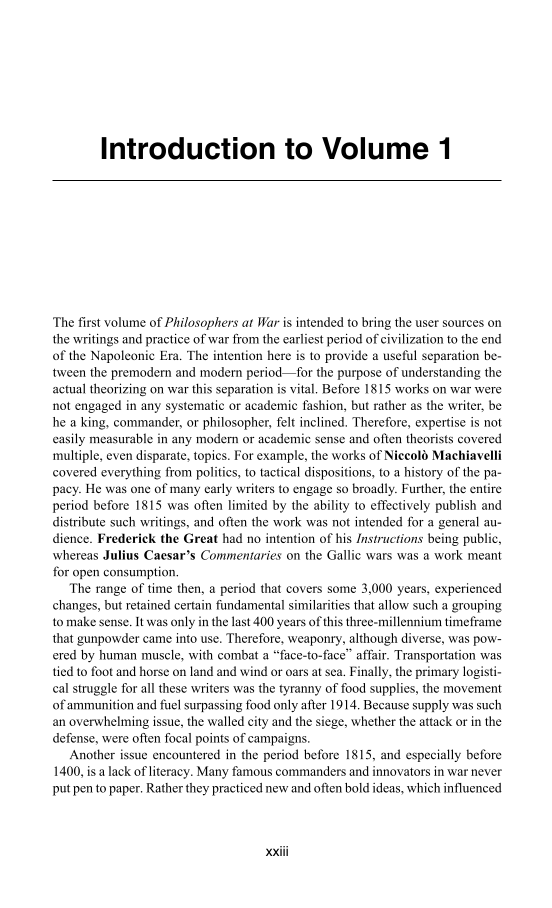xxiii Introduction to Volume 1 The first volume of Philosophers at War is intended to bring the user sources on the writings and practice of war from the earliest period of civilization to the end of the Napoleonic Era. The intention here is to provide a useful separation be- tween the premodern and modern period—for the purpose of understanding the actual theorizing on war this separation is vital. Before 1815 works on war were not engaged in any systematic or academic fashion, but rather as the writer, be he a king, commander, or philosopher, felt inclined. Therefore, expertise is not easily measurable in any modern or academic sense and often theorists covered multiple, even disparate, topics. For example, the works of Niccolò Machiavelli covered everything from politics, to tactical dispositions, to a history of the pa- pacy. He was one of many early writers to engage so broadly. Further, the entire period before 1815 was often limited by the ability to effectively publish and distribute such writings, and often the work was not intended for a general au- dience. Frederick the Great had no intention of his Instructions being public, whereas Julius Caesar’s Commentaries on the Gallic wars was a work meant for open consumption. The range of time then, a period that covers some 3,000 years, experienced changes, but retained certain fundamental similarities that allow such a grouping to make sense. It was only in the last 400 years of this three-millennium timeframe that gunpowder came into use. Therefore, weaponry, although diverse, was pow- ered by human muscle, with combat a “face-to-face” affair. Transportation was tied to foot and horse on land and wind or oars at sea. Finally, the primary logisti- cal struggle for all these writers was the tyranny of food supplies, the movement of ammunition and fuel surpassing food only after 1914. Because supply was such an overwhelming issue, the walled city and the siege, whether the attack or in the defense, were often focal points of campaigns. Another issue encountered in the period before 1815, and especially before 1400, is a lack of literacy. Many famous commanders and innovators in war never put pen to paper. Rather they practiced new and often bold ideas, which influenced
Document Details My Account Print multiple pages
Print
You have printed 0 times in the last 24 hours.
Your print count will reset on at .
You may print 0 more time(s) before then.
You may print a maximum of 0 pages at a time.

























































































































































































































































































































































































































































































































































































































































































































































































































































































































































































































































































